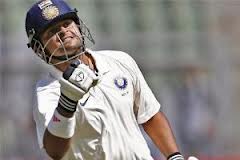
Mumbai, Feb 7: Suresh Raina on Thursday sent a timely reminder to the selectors for his Test recall with a brilliant century to help Rest of India post a huge first innings total of 526 but the hosts replied strongly reaching 155-2 on day two of the Irani Cup match here.
Left-handed Raina, ignored for the entire four-Test rubber against England by the selectors in November-December last year, notched up 134 — his 11th first class century — in eight minutes under five hours.
In-form Mumbai opener Wasim Jaffer, also seeking a return to the Test team after four years, and one-down batsman Ajinkya Rahane led the home team’s reply with individual half centuries.
At stumps, the hosts were 371 runs behind Rest of India with Rahane not out on 55 after a stay of 174 minutes and giving him company was nightwatchman Shardul Thakur (4) with Sachin Tendulkar to bat on Friday.
Jaffer, who mustered over 800 runs this season in Ranji Trophy in seven games, was caught behind for 80 by Ambati Rayudu off Shantakumaran Sreesanth. He put on a partnership of 132 runs for the second wicket with Rahane.
Earlier, Raina, who struck 14 fours and 5 sixes in his 169-ball essay, added 153 runs in only 172 balls in a punishing seventh wicket stand with Abhimanyu Mithun, who made 51 with nine fours and a six.
Mumbai secured a wicket early on in the fifth over of the day as their pace leader Dhawal Kulkarni dismissed rival captain Harbhajan Singh (26) through a fine diving catch at short covers.
Rest had advanced by 22 runs to 352 when Harbhajan was caught by his Mumbai counterpart Abhishek Nayar, but thereafter the home team’s wayward bowling was torn to shreds by Raina, overnight not out on 36, and Mithun as they strung a huge stand of 53 off 172 balls to take the score past 500.
The seventh wicket duo feasted on the appalling bowling by Mumbai in which Shardul Thakur was the main culprit as he conceded 135 runs in 27 overs to help Rest adjourn for lunch at 487/6 after commencing the day at 330/5.
Raina played the spinners with ease and raced from 50 to his 11th first class 100 in just 37 balls. The southpaw hit Rohit Sharma for three fours in an over to start the run-spree while Mithun struck Chavan for a big six over mid-wicket in the latter’s first over of the day.
The 100 of the partnership came up in just 97 minutes after Raina reached his personal milestone in 140 balls.
Rest crossed the 500-mark when Raina stepped out to Dabholkar and carted him for his third six and then Mithun reached his half century off 87 balls. Post-lunch, Rest lost their last four wickets for the addition of 39 runs, the first three wickets falling in 13 balls as Ankit Chavan who was expensive in his short stints earlier, grabbed three wickets in a spell of 4.1-1-8-3.






Comments
Add new comment